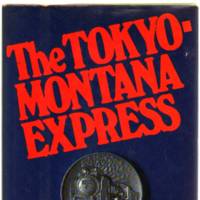There is a magical realism to the first steps in a new country. Some of the finest prose to convey this enchantment is Richard Brautigan's short story collection "The Tokyo-Montana Express," first published by Delacorte Press/Seymor Lawrence in 1980. Like stations on a fantasy railroad, the vignettes freewheel between Japan and America, making you laugh out loud and then quiet with melancholia.
Brautigan nails Tokyo like only a foreigner can. "The bars are closing in Shibuya," he writes in "Shrine of Carp," "and thousands of people are pouring out into the streets like happy drunken toothpaste, laughing and speaking Japanese."
On permanent vacation at a hotel in Shinjuku, Brautigan whiles away time in cafes, penning whimsical observations of the people and things that he sees. He turns everyday moments into poetry, musing playfully on the beautiful oranges of Osaka, a pasta dinner with live eels that swim in their bucket "like science-fiction children of spaghetti," or a hangover so exhausting it can only be described as grotesque folk art.
A theme present at many stops is aging and mortality — a sadness calmed only by the interest in people, most notably women. There is a gentle humanism in Brautigan's voice that was to influence Haruki Murakami. But only Brautigan could finish a musing on umbrellas, which — no matter the forecast — mysteriously appear in the hands of Tokyoites whenever needed, with the indelible line: "Who are these umbrellas?"
Read archived reviews of Japanese classics at jtimes.jp/essential.


















With your current subscription plan you can comment on stories. However, before writing your first comment, please create a display name in the Profile section of your subscriber account page.